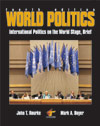The sovereign state has been the primary actor in world politics and the essential building block of the state-based international system. Indeed, it is hard to conceive of any other form of organizing and conducting international relations. Yet there are alternatives.
International organization is one of these alternatives (Diehl, 1996). As we have seen, there are many drawbacks to basing global relations on self-interested states operating in an anarchical international system. Many observers believe that global, regional, and specialized international organizations can and should begin to authoritatively regulate the behavior of often-conflicting states. Advocates of strengthened international organization believe that it is time to address world problems by working toward global solutions through global organizations. Those who take this view would join in the counsel given by Shakespeare in Henry VI, Part III: "Now join your hands, and with your hands your hearts." Such advice may be right. It is just possible that ongoing organizations will serve as prototypes or building blocks for a future, higher form of political loyalty and activity.
It is all too easy to dismiss the notion of international organizations as idealistic dreaming. But there was also a time when we believed that the world was the center of the universe. We now know that is not true; perhaps we can also learn that the national state need not be the center of the political cosmos. Surrendering some of your country's sovereignty to an international organization may seem unsettling. But it is neither inherently wrong, nor unheard of in today's world. In fact, the growth in the number, functions, and authority of international organizations is one of the most important trends in international relations. To explore this change in governance, this chapter will take up international organizations. The European Union, as a regional organization, and the United Nations, as a global organization, will be given particular attention to illustrate what is and what might be. Shakespeare tells us in Hamlet that "we know what we are, but not what we can be." Perhaps he was correct in saying that we cannot know for sure what we can be, but we surely can imagine what we might be if we keep our minds open to new ideas. |



 2002 McGraw-Hill Higher Education
2002 McGraw-Hill Higher Education